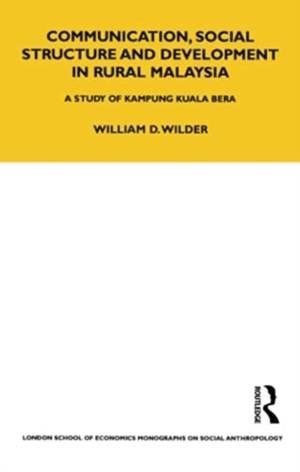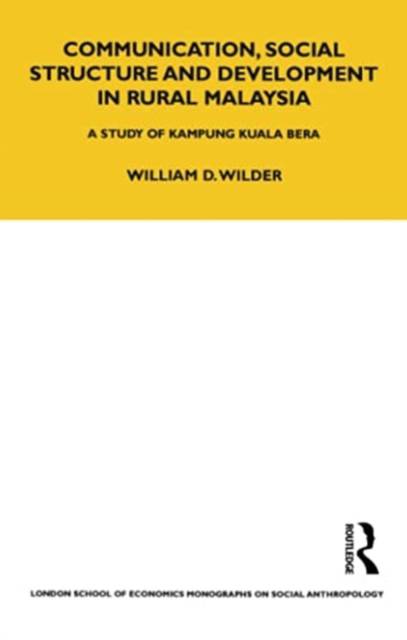
Door een staking bij bpost kan je online bestelling op dit moment iets langer onderweg zijn dan voorzien. Dringend iets nodig? Onze winkels ontvangen jou met open armen!
- Afhalen na 1 uur in een winkel met voorraad
- Gratis thuislevering in België vanaf € 30
- Ruim aanbod met 7 miljoen producten
Door een staking bij bpost kan je online bestelling op dit moment iets langer onderweg zijn dan voorzien. Dringend iets nodig? Onze winkels ontvangen jou met open armen!
- Afhalen na 1 uur in een winkel met voorraad
- Gratis thuislevering in België vanaf € 30
- Ruim aanbod met 7 miljoen producten
Zoeken
Communication, Social Structure and Development in Rural Malaysia
A Study of Kampung Kuala Bera
William Wilder
€ 83,95
+ 167 punten
Uitvoering
Omschrijving
This is an important innovative analysis of communication and society in Pahang, West Malaysia, based on fieldwork carried out in Kampung Kuala Bera. Dr Wilder is concerned with communication networks of all kinds as found in a long-established Malay village, including the uses of language, small-scale (kinship and village-based) networks, and higher-level systems (the district and the nation as a whole). Dr Wilder lays particular emphasis on the role of communication in the process of economic development and on administration during a period of rapid and induced social change. His study is prefaced by a detailed historical account of Pahang and a thorough sociological analysis of Kampung Kuala Bera. The ethnography is meticulously detailed; its special contribution includes the first-ever publication of a Malay village genealogy, a systematic account of birth-order names (a major feature of the kinship system), complete figures on marital breakdowns for the whole village population, and an intensive analysis of leadership in its local context. This work will be of value to students of Southeast Asian societies, rural sociology, network studies, economic development, political education and the mass media in third world countries.
Specificaties
Betrokkenen
- Auteur(s):
- Uitgeverij:
Inhoud
- Aantal bladzijden:
- 234
- Taal:
- Engels
- Reeks:
- Reeksnummer:
- nr. 18
Eigenschappen
- Productcode (EAN):
- 9780367716479
- Verschijningsdatum:
- 31/03/2021
- Uitvoering:
- Paperback
- Formaat:
- Trade paperback (VS)
- Afmetingen:
- 137 mm x 213 mm
- Gewicht:
- 272 g

Alleen bij Standaard Boekhandel
+ 167 punten op je klantenkaart van Standaard Boekhandel
Beoordelingen
We publiceren alleen reviews die voldoen aan de voorwaarden voor reviews. Bekijk onze voorwaarden voor reviews.











